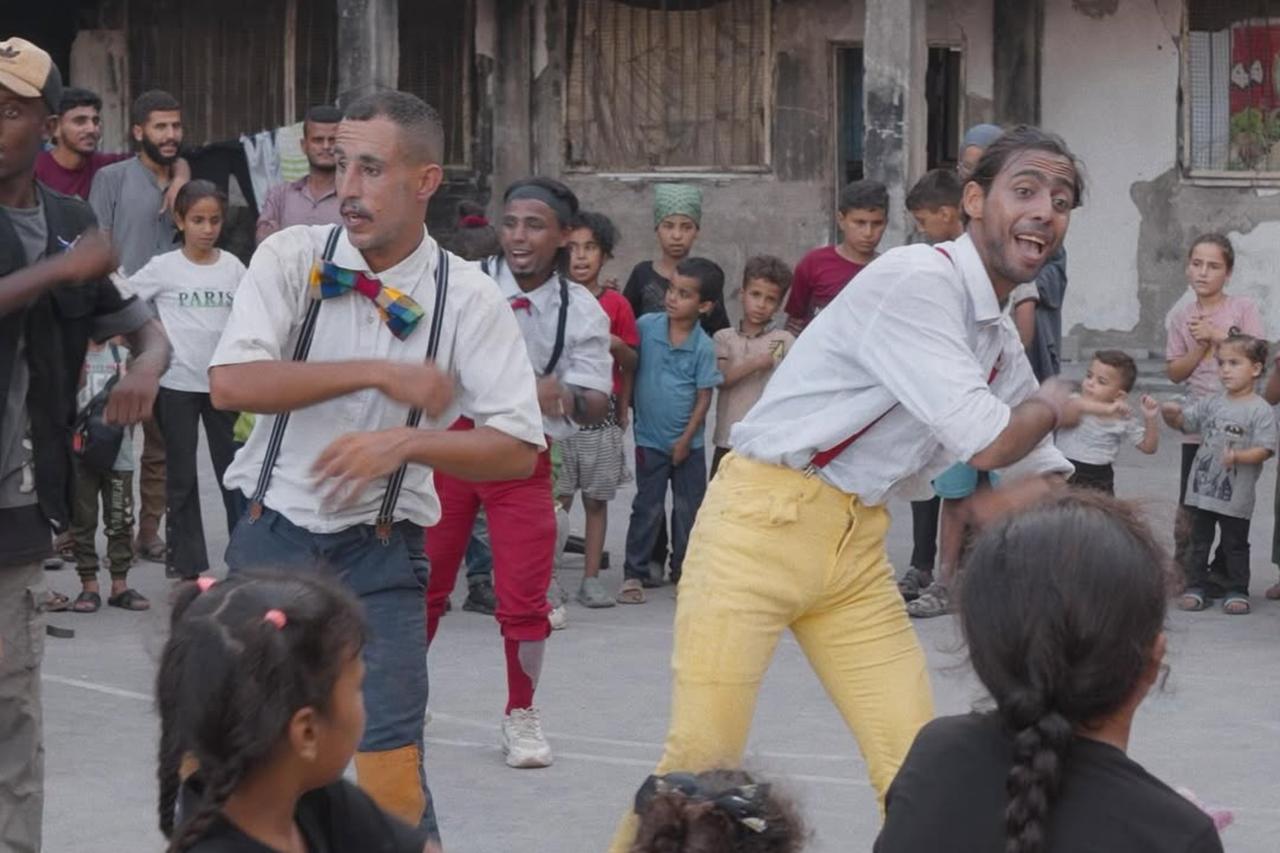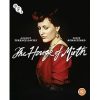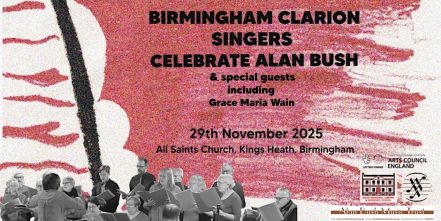
On Saturday 29 November, the Birmingham Clarion Singers will give a free afternoon concert in All Saints Church, Kings Heath — a tribute to Alan Bush, exactly 125 years after his birth. The concert, featuring the rarely performed cantata The Winter Journey, reaffirms the choir’s deep and enduring connection to Bush: he was not only a mentor, but a close friend of the choir since its early days.
At the helm is Jane Scott, the choir’s conductor, who spoke with Alan McGuire about what this concert means not just musically, but politically and emotionally.
AM: How does Birmingham Clarion Singers see itself in the vast world of music? How would you describe the choir’s ethos today?
JS: Throughout the choir’s 85-year history we have linked our repertoire to the campaigns for peace, international solidarity, and the class struggle, both historical and present, and we always make clear how the music we sing is relevant to those issues.
Our programmes have included works by Brecht and Eisler, many Workers’ Music Association composers, traditional and campaigning songs from Africa, South America, Europe, Ireland, traditional British Labour movement songs and anthems, Chartist songs, songs from Joan Littlewood’s Theatre Workshop, songs from the USA by Pete Seeger, Earl Robinson, Woody Guthrie and more contemporary writers, well-known demonstration staples from the Peace and Trade Union movements, contemporary topical songs shared by other choirs and songwriters, commissioned works by contemporary composers, traditional folk songs, and songs which have now become part of that tradition by writers like Ewan MacColl — as well as occasional songs written by our own members.
There have also been Clarion performances of operatic and choral pieces presented as part of programmes dealing with issues such as peace, workers’ rights, and feminism.
Our programmes are tailored to the occasion such as IWD, the Cradley Chainmakers’ Festival, Hiroshima Day, etc. and we choose and adapt repertoire to make the most effective use of the voices we have available. Whilst working to develop every member’s skills and musical knowledge, we always keep in mind that Clarion is a collective where everyone’s commitment and contribution is valued and key to the impact of our message.
Our continuing aim is to give creditable performances of good music in a range of styles, presented so that they illustrate and underpin our broad purpose of striving for peace and justice and hopefully giving our listeners food for thought, inspiration, and renewed conviction.
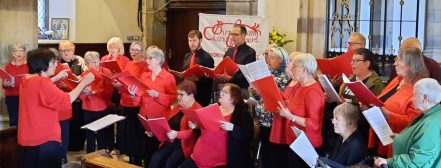
AM:This concert marks the 125th anniversary of Alan Bush. What does Alan Bush mean to you and Birmingham Clarion Singers?
JS: Alan Bush was involved with Clarion from its beginning. His interest in the choir gave it the opportunity to participate in many events outside of Birmingham and gave us access to a wider range of music, including, but by no means exclusively, Alan’s own.
In 1940 he came to Birmingham to rehearse the choir at their venue in an upstairs room of The Albion pub, now known as The Old Contemptibles. Founder members recalling that first meeting described the impact of his dynamic presence and the underlying authority of his personality. During the practice the air raid siren sounded and they all repaired to a shelter, where Alan calmly continued with the rehearsal against the background sounds of bombing.
Alan was a patient and meticulous teacher with high expectations, always paying close attention to the singers’ diction and spending considerable time having them repeat separately all the consonants until he felt they were sufficiently well enunciated. Members who knew him always said that it was thanks to Alan that the Clarion Singers were so frequently complimented on the clarity of their sung words.
He did not use his own singing voice to demonstrate the effects he wanted, but he would often declaim key sections of the text to show in what spirit they were to be sung by the choir. The force and conviction of his delivery style left us in no doubt as to what was required from our interpretation.
Throughout his life he continued to be a friend and mentor to Clarion. When Paul Robeson died in 1976, Alan succeeded him as our president. Until the end of his life he took an active interest in the choir, attending rehearsals occasionally, sometimes giving detailed notes to the conductor afterwards, and getting to know individual members, several of whom became personal friends.
Alan was a committed and steadfast communist whose confidence in the potential for working people across the world to take control of and shape their future never wavered.
On the occasion of Alan’s eightieth birthday, as part of a concert of his works, we performed his cantata Africa Is My Name in Birmingham Museum and Art Gallery, attended by Alan and Nancy, at the end of 1980. We then joined the WMA Singers for a further concert in the Purcell Room on the South Bank in January 1981. Similarly in 1985 and 1990 we marked his birthdays with concerts of his music.
We continue to perform his songs in our programmes now in the 2020s — the messages in their words and the conviction in their music as strong and relevant as ever.
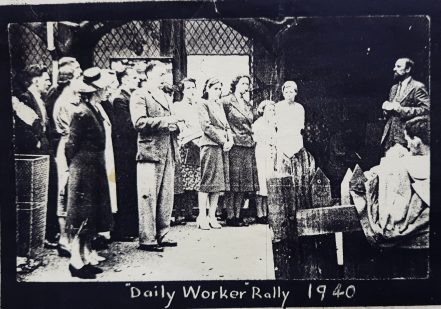
AM: Bush’s works for voice are often his most overtly political. Can you tell us a bit about them?
JS: Firstly, of course, the fact that Alan’s vocal music has words which carry the message without any risk of its being lost or misinterpreted means that his political motivation is made crystal clear.
All of his operas deal with events from the history of collective struggle. In taking these as his subjects, Alan provided visual and dramatic representations of the strength and resourcefulness of humanity organising together — inspiring audiences and demonstrating how people can unite to bring about change.
Many of Alan’s songs and choral works were written with the intention that they be sung by large amateur choirs. By providing working people with the opportunity to learn his music and perform it collectively, with words pertinent to their own experience and aspirations, Alan was putting his principles into practice.
AM: Can you tell us a bit about the programme for this concert? Why have you chosen The Winter Journey and the other pieces?
JS: Everything in the programme is chosen to demonstrate Alan’s lifelong principles and the way in which his life and work reflected them.
The first section, performed by Clarion, includes a range of Alan’s vocal music written between 1940 and 1980. The opening item, “Our Song”, was commissioned for the opening of Nottingham Co-operative Arts Centre in 1948. It sums up the belief held by both Alan and Nancy that their music should celebrate the lives of working people, give them inspiration, and strengthen their will to unite for change.
“The Joy of Harvesting” and “Song of Cowbells” are Alan’s arrangements of songs from North Vietnam and North Korea respectively, with English words by Nancy. His choosing these songs reflects Alan’s internationalism and commitment to the fight against imperialism across the world.
“Song for Angela Davis” salutes the African American Civil Rights activist who has inspired generations of campaigners. The text by Nancy reflects the futility of trying to suppress and silence Angela through imprisonment and paraphrases her famous quote adapted from James Baldwin: “For if at morning you are taken, then they will come for us at night.”
The finale from Act 1 of Alan’s opera Wat Tyler takes place at the stage in the story when the mobilised peasants have stormed Maidstone Prison and released John Ball, the priest imprisoned for preaching against serfdom. He addresses the crowd and they resolve to fight against tyranny and make their message heard.
“The Ice Breaks” and “Truth on the March,” with words by Randall Swingler, were composed for the 1940 radio play Freedom on the Air. The songs refer to the resistance against the Nazi invasion of Europe and the determination for a return to peace.
The middle section of the concert is a recital of Alan Bush’s works by our distinguished guest soprano, the award-winning Grace Maria Wain. Her programme includes arias from Alan’s operas The Press Gang, Men of Blackmoor, and Wat Tyler, as well as the Prison Song Cycle and Song of the Hunger Marchers.
The final item in the concert is Alan’s 1946 cantata The Winter Journey, with soloists Grace Maria Wain and Clarion’s current president, the writer, singer, actor, broadcaster, and activist Tayo Aluko. The text, by Randall Swingler, is based on the journey to Bethlehem in the Nativity story and the arrival in the city where none would offer shelter. Its subject posed a clear parallel to the post-war situation when the work was written but is equally relevant to our own times, when dispossessed people seeking safety and livelihood are demonised and rejected in favour of the wealthy and privileged. The final chorale poses the warning that the journey — and all that is implied in the Christmas message — has been in vain “unless we make some place to lay the child”.
AM: Alan Bush believed in music as a collective act. Do you feel that community singing and music still has a role to play in today’s individualistic society?
JS: There was certainly a time starting from about 1960 when choirs went out of fashion as a social pastime other than for musicians or people with a particular interest in choral music.
However, as we all know, there now exist many choirs to suit all tastes and skill levels, and singing with other people has once again become a very popular relaxation pastime. Perhaps the individualistic nature of today’s society, which tends to lead to isolation, is the very thing that has helped to bring about this renewed interest in belonging to a choir because people need community, and people need to sing.
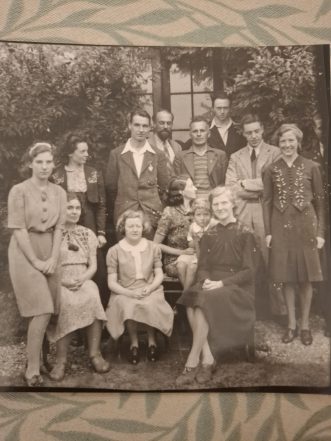
Source: Clarion Archive
In Clarion we particularly applaud and celebrate the renaissance of other campaigning choirs over the past thirty years. When Birmingham Clarion Singers first came into existence there were many large choirs attached to the Labour Movement, and it was for them that much of Alan’s early choral music was composed. By the mid-1960s most had disbanded, but today the situation has turned full circle, and now we have comrade choirs across the UK. Once again there is widespread recognition of the value of collective singing as a powerful weapon in the fight to achieve a healthier and fairer world. Alan’s music remains as meaningful as ever in that struggle.
The Birmingham Clarion Singers will perform Alan Bush: A Celebration on Saturday 29 November, at 3:00 pm, at All Saints Church, Kings Heath. The concert includes Bush’s cantata The Winter Journey, alongside other choral works reflecting his life and legacy. Admission is free, but places are limited. Reserve your tickets here.



